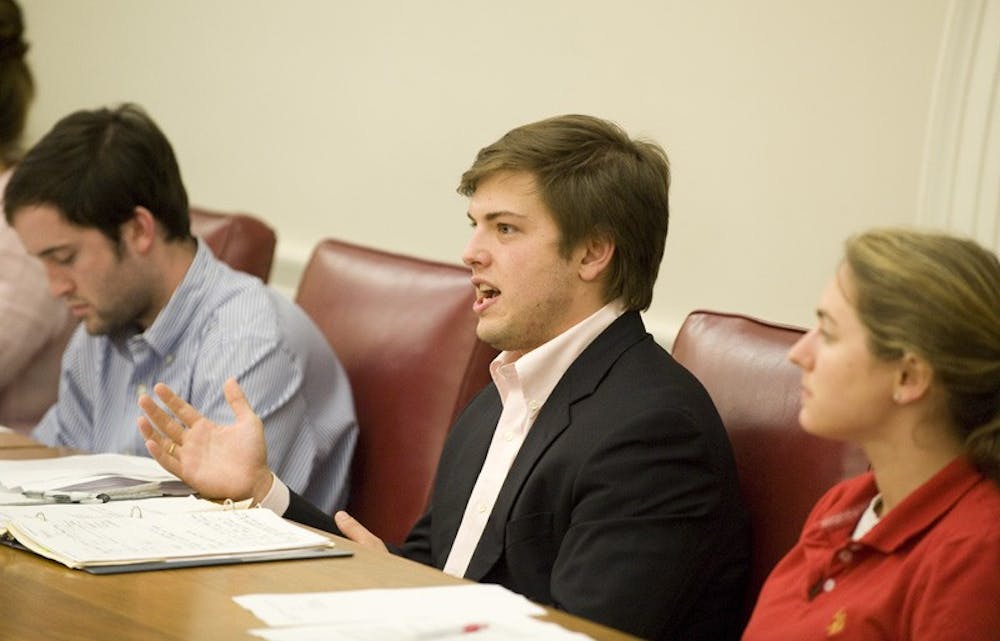In response to concerns about the fallout of cases not brought to trial, Honor Committee members discussed last night the possibility of sending a letter to offense reporters after a case has been dropped to describe why the case was dropped and invite discussion if desired.
Alexander Cohen, a representative for the Graduate School of Arts & Sciences and former Cavalier Daily opinion columnist, presented the letter template that would be sent to reporters after a case has been dropped by the Investigative Panel.
The template Cohen created begins by thanking the reporter for his "time, effort and moral commitment" for reporting what he felt was an honor offense to the Committee. The template then goes on to provide several outlets for explaining not only why the Committee dropped the case, but also if the Committee believed the reporter was acting honorably in his action of reporting. If the Committee deems the reporter to have acted dishonorably, the letter explains that an investigation has been initiated against the reporter.
The letter is important for several reasons Cohen argued.
First, "some specificity is provided in terms of what element the I-panel based its decision on," Cohen said.
More importantly to Cohen though, is that the letter would enable the Committee to tell the reporter that the members "really do believe the reporter acted honorably," which Cohen believes to be "vital" because he feels that current system may imply that the Committee does not.
"I think when we say we've decided that [it is not likely an honor offense occurred]," but the reporter believes that an offense has occurred, then questions may be raised about the reporter's "integrity, truthfulness, accuracy and personal judgment." Cohen said this may include the notion that the Committee felt the reporter incorrectly identified an honor offense, was wrong in his reporting or gave a false report, which is a dishonorable act in and of itself.
Cohen said the letter is not meant to be an invitation for the reporter to fight the I-panel about its decision. Instead, the letter will act as a means for the "I-panel members and reporters each to understand how the matter looked to the other," so that each part can learn from one another and their decision-making, he said.
"It can be an educational experience for both parties, and it's a procedure that affirms mutual respect," Cohen added.
Honor Chair David Truetzel noted that this system could be beneficial because it could "ensure our relationship with reporters is strong," as well as help reporters better understand the investigation of a case.
Several committee members, however, raised concerns about Cohen's proposal.
Law School Rep. Charlie Harris expressed apprehension about using the letter to explain whether the Committee believes the reporter to be honorable. The "default rule is a presumption of innocence" for the reporter and that there is no "color of guilt" on the reporter if a case is dropped, he said. Moreover, Truetzel added that there has never been a situation "to his knowledge" in which a report was filed against a reporter.
Cohen, though, said he is "aware of such a case."
Another concern expressed by some Committee members is the proposed letter's potential to open up discussion after a case has been dropped. Under the current system, if a case is dropped after investigation, all relevant materials are shredded to maintain confidentiality, Vice Chair for Education Rob Atkinson said.
If a case is closed, Atkinson said, no further opportunity should be provided for people to come together and talk about it.
Truetzel agreed with Atkinson, adding later that because the decision of the I-panel is final, there is "no point" in discussion because "it's not going to change." Truetzel said discussion may also increase the risk of confidential information being "leaked out."
To retain the benefits of Cohen's letter but protect case confidentiality, Truetzel suggested other methods of increasing openness and communication between reporters and the Committee, such as a survey for reporters about how they feel their cases were handled, obtaining more feedback from the honor advisers assigned to reporters during an investigation and other "less formal" routes.\n"I think there's a way to get feedback without having to rehash the arguments of the case," Truetzel said.
Because implementing Cohen's letter would not require a by-law change, Truetzel said, executing the proposal would be purely at the discretion of Vice Chair for Trials Mary Siegel.
He added, though, that discussion about the topic will continue, and said the Committee may vote on it in the future.
Clarification: This article originally stated that, "Moreover, [Honor Chair David] Truetzel added that there has never been a situation 'to his knowledge' in which a report was filed against a reporter. Cohen, though, said he is 'aware of such a case.'" The article should have been clarified to state that the "case" in question was of a hypothetical variety, in which a reporter felt that the Honor Committee, by deciding not to move ahead to trial, implied that the reporter acted in bad faith. According to Truetzel, this situation could arise without the Honor Committee initiating an actual report against a reporter, accounting for the apparent discrepancy in yesterday's article.







